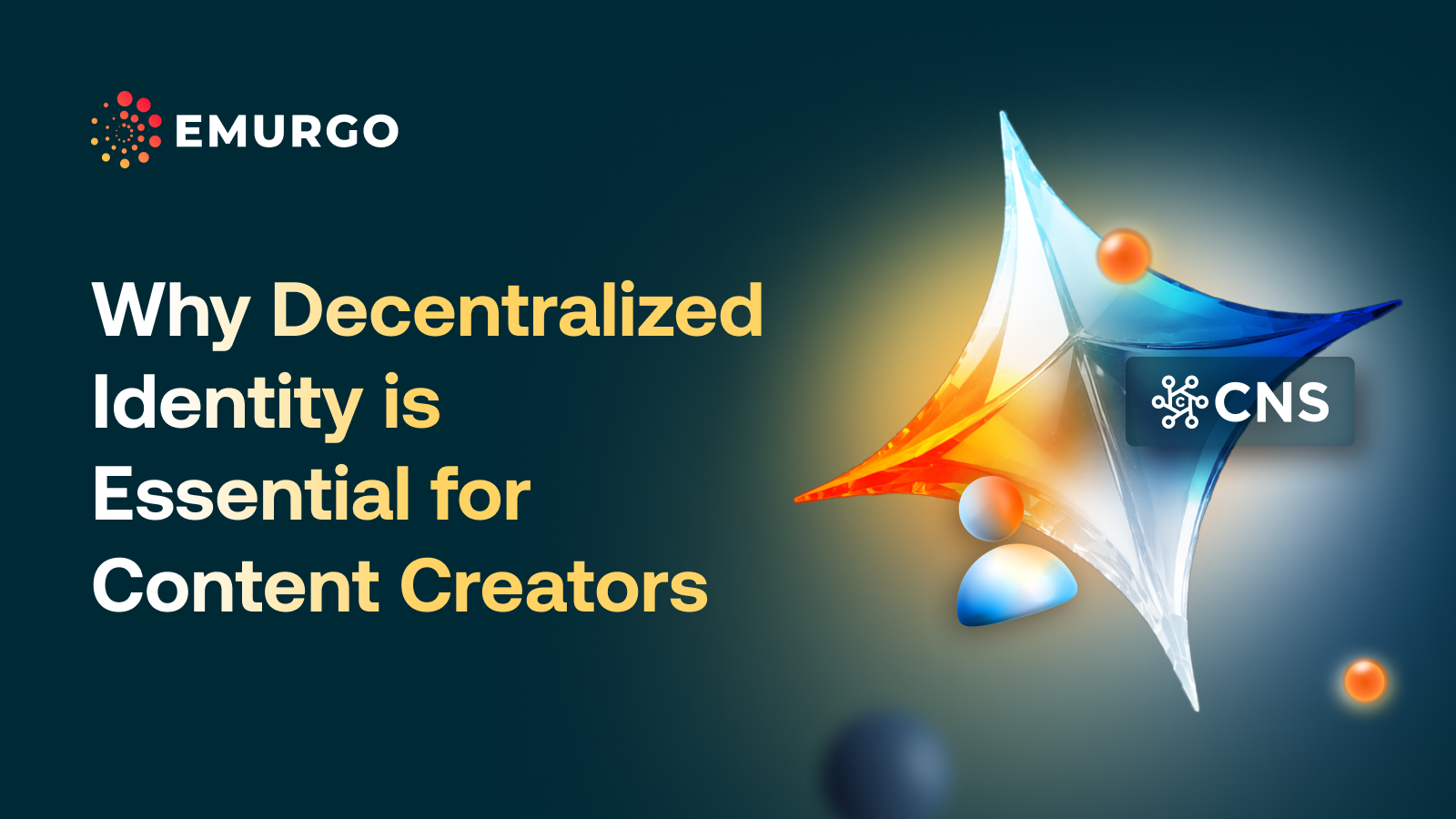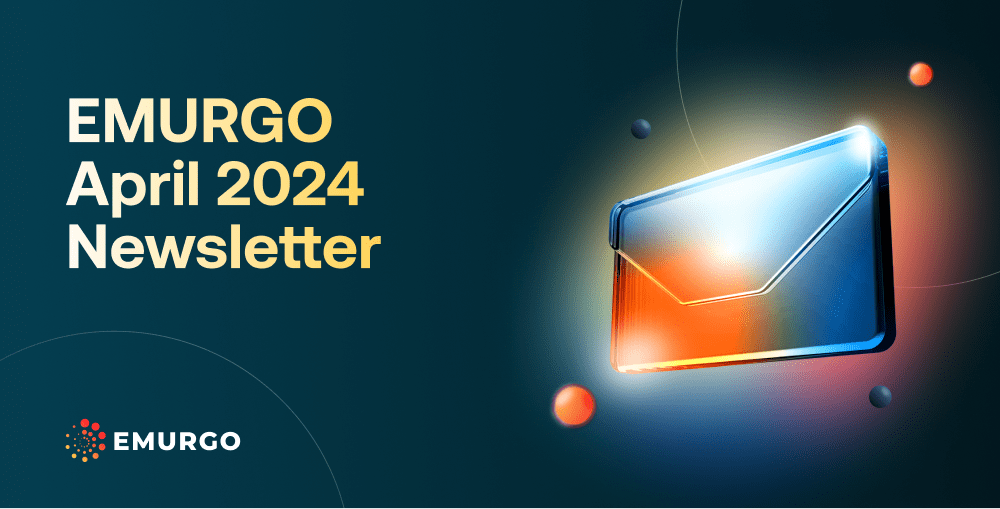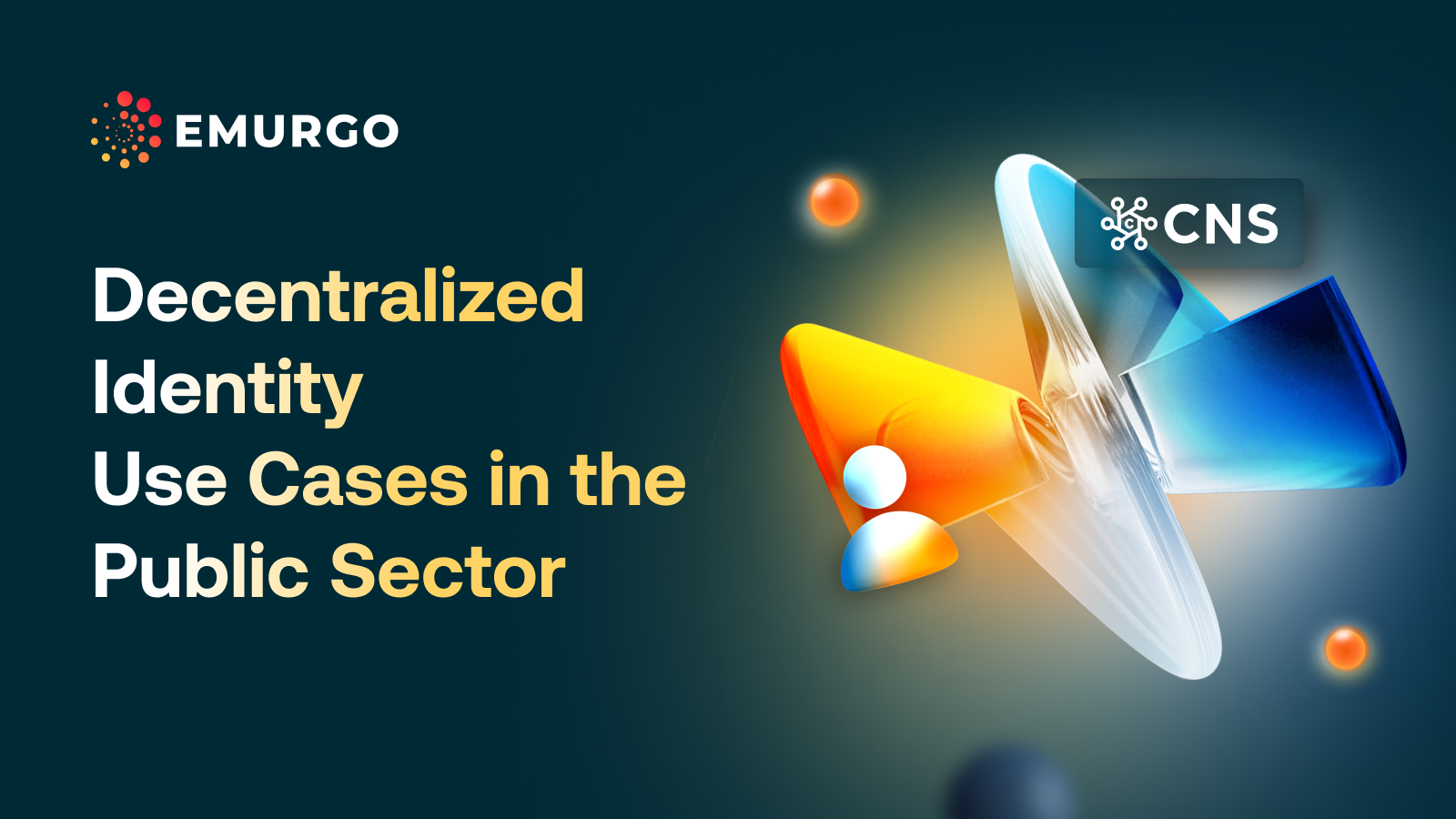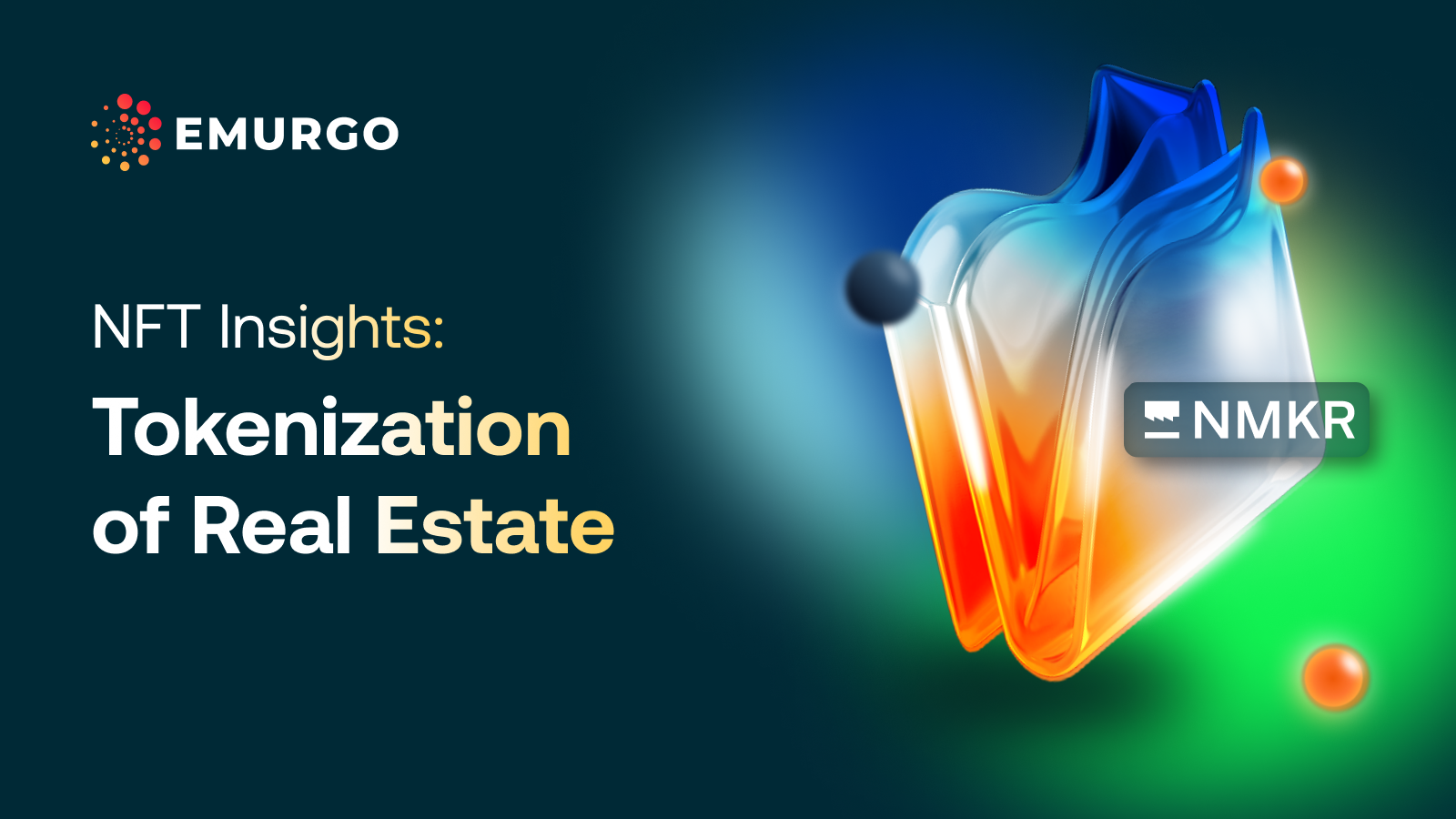In previous blogs on decentralized identity solutions, it has been discussed how these can uniquely secure and hand control over personal data back to users.
Decentralized identity solutions can be applied to various industries where individual user data is collected and needed to provide services. As it stands now, most user data collection and storage is handled by centralized companies and organizations that provide user products & services.
In this blog, let’s examine the application of decentralized identity solutions to the emerging content creation industry and how content creators can benefit in a fast-evolving, but still mainly centralized digital landscape.
Content creation started to take off within the past two decades with the advent of affordable broadband technology, smartphones, and social media applications such as YouTube. These three factors enabled individual users and organizations to start producing and promoting their content directly to viewers. It also helped viewers to easily share content with others with the simple click or tap of a button.
According to HubSpot, the content creation industry worldwide is valued at around $104.2 billion, depending on how content creation is defined. The US alone accounts for $25.6 billion of that market and it’s expected to keep growing at least until the end of the decade.
Related reading:
- Here are some decentralized identity use cases by industry
- A decentralized identity service for Cardano blockchain users
- Yoroi Wallet supports custom wallet addresses including CNS
This growth is attracting many companies to invest more in the content creation sector and expand how it is monetized. Many new platforms have launched and this has also sparked the birth of media influencers or key opinion leaders in many different points of interest who build a following through producing engaging content.
Despite its explosive growth, the content creation industry has some problems.
Many stem from the structure of the internet and cannot be solved using the current technology.
Let’s go over some of these issues:
- Ownership and distribution
The main problem with the current content creation model is ownership of the content. In today’s industry, the content is owned by the creator, but distribution is controlled by the social platform.
At any point, a social network can stop distributing content from a creator without ever giving a reason. Not only that, the content format is controlled by the platform, which means, migrating the content to other platforms – in many cases competitors – is made as difficult as possible.
- Right to use
Another problem is the reuse of content created by a particular person. There isn’t a reliable way to tag and control content once launched on social media. It can be downloaded and reused without permission. Many times on social media, the content seen has been plagiarized, misused, and even reposted out of context by other creators.
It’s difficult to track when this happens and it can be a lengthy process to prove plagiarism happened in the first place.
- Monetization
Content creation platforms cannot exist without creators. Yet, these platforms take a considerable amount from a creator. Some have a 50/50 split with creators which does not include transfer fees or exchange rates for foreign currencies and others take anywhere from 8% to 12% of the revenue made by creators, again, excluding transfer fees and conversation rates.
All those deductions are before taxes, which means the creators using these platforms lose substantial portions of their income in just processing fees.
- Lack of transparency
Content creation platforms can be obscure in how they promote or distribute content. This creates enormous uncertainty for content creators as they might suddenly have their content blocked or removed from the platform for violating the terms of service.
- Audience
The audience or followers of a content creator are owned by the social media platform. Even if a person has cultivated a large following, these numbers don’t translate outside the platform, which locks content creators to just a few social channels.
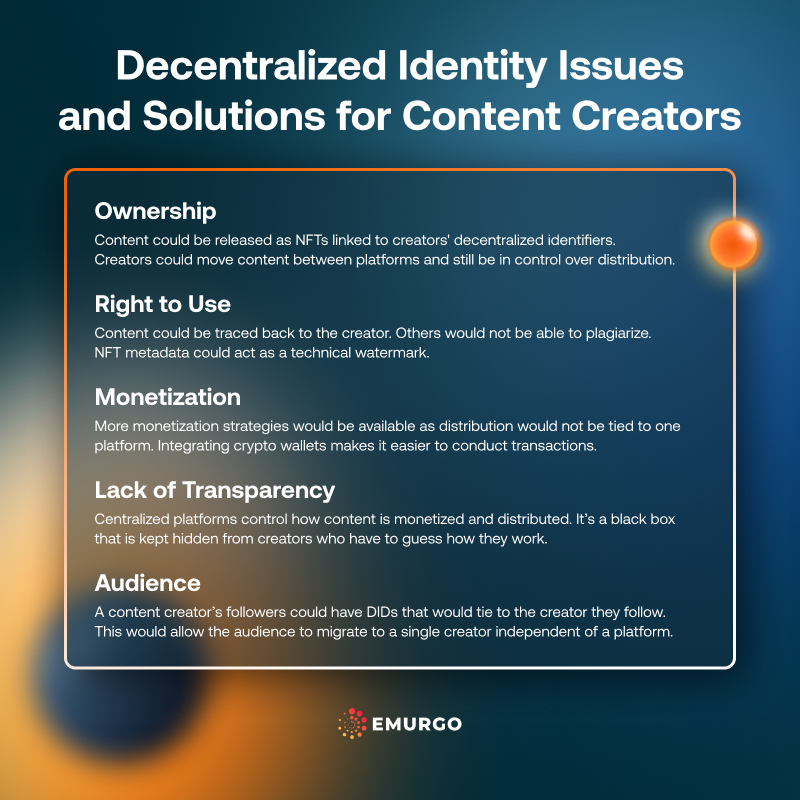
In the areas mentioned above, decentralized identity can have a major impact as a potential solution:
- Ownership
Content produced by creators could be released as NFTs linked to their decentralized identifiers (DIDs). They would be able to move content from different platforms without having to repackage it to a new format and be in control over its distribution.
- Right to use
Every piece of content could be traced back to the creator. Others would no longer be able to plagiarize the media. The metadata could include this information, essentially acting like a watermark on a creator’s content.
- Monetization
More monetization strategies would be available as distribution would not be tied only to one platform. Using or integrating crypto wallets also makes it easier to remit and conduct transactions with less friction and in real-time on a global scale.
- Lack of transparency
The way content is monetized, and distributed, and how it’s hosted is up to the developers controlling the platform. It’s a black box that is kept hidden from the creators who have to guess how those systems work without any input on how to improve them.
- Audience
A content creator’s followers could also have DIDs that would tie to the creator they follow. This would allow the audience to migrate to a single creator independent of the social media platform.
Cardano Connect (CNS) offers ideal solutions for content creators because it is a decentralized social networking platform built on Cardano, allowing content creators the chance to manage their social profiles and identities directly on Cardano, using .ada domain names as their social identity portals.
The .ada extension also allows them to receive funding directly to their Cardano wallet such as Yoroi, as the extension resolves to a valid Cardano wallet. This cuts down on the fees and commissions they have to pay. The .ada also opens new monetization strategies for those who are releasing content on the internet.
Read more: Yoroi Wallet integrates CNS
Finally, the .ada extension is attached to a domain name bought by the content creator. This makes them a recognizable brand on Cardano and allows them to be more easily recognized by the community at large.
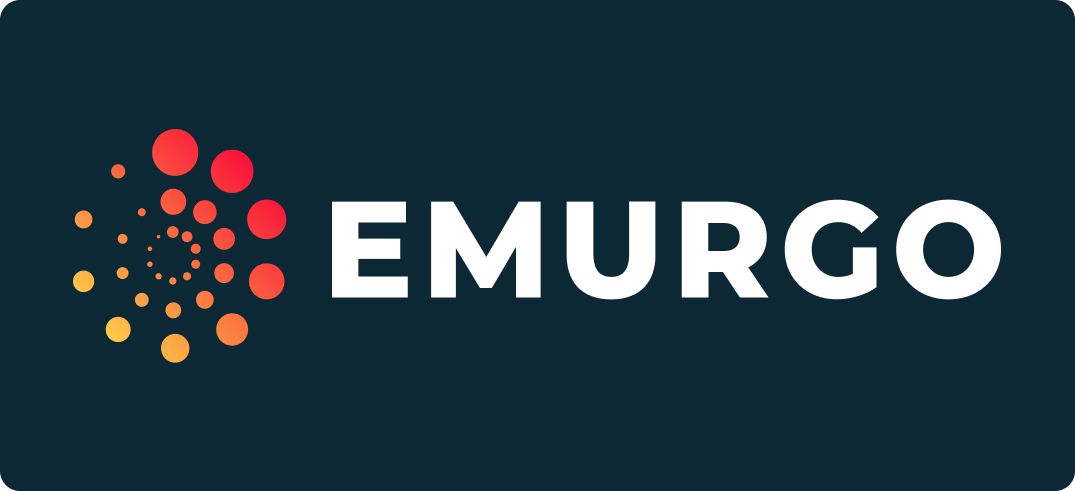
Want to receive daily and weekly updates on EMURGO’s activities and related blockchain ecosystem news?
Then, follow EMURGO on X to learn about the latest blockchain education courses, events and workshops, Web3 project funding opportunities, and more.
About EMURGO
- Official Homepage: emurgo.io
- X (Global): @EMURGO_io
- YouTube: EMURGO channel
- Facebook: @EMURGO.io
- Instagram: @EMURGO_io
- LinkedIn: @EMURGO_io
Disclaimer
You should not construe any such information or other material as legal, tax, investment, financial, or other advice. Nothing contained herein shall constitute a solicitation, recommendation, endorsement, or offer by EMURGO to invest.
